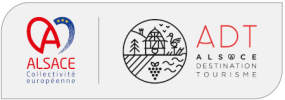Strasbourg, European capital
The European Parliament
The European Parliament is the parliamentary body of the European Union whose 705 members from 27 states are elected every five years by direct universal suffrage to represent the 450 million voters. The parliament has a legislative, budgetary and political role.
The MEPs have been gathering in this impressive 220,000m² building since 1999! Inside, in addition to the 800-seat hemicycle, there are also numerous offices and committee rooms, making the Parliament the largest transnational electorate in the world and the main institution of the European Union.
-
Allée du Printemps, 67070 Strasbourg
-
Groups of up to 75 people
-
Multimedia guides available in 24 languages
-
60 minutes visit to the Hemicycle and the Parlamentarium
The Council of Europe
Created by the Treaty of London on 5 May 1949, the Council of Europe defends democracy, human rights and the rule of law in Europe through various actions such as: international conventions, monitoring missions or recommendations to its member states. Currently, 46 member countries representing approximately 675 million people are members.
-
Avenue de l’Europe, 67075 Strasbourg
-
Visits for groups of at least 15 people
-
In English, French or German
-
1h to 1h30 visit for the hemicycle
The Parliamentarium Simone Veil
Inaugurated in 2017, this space is divided into three areas: a 360° cinema, a role-playing game for groups and a series of interactive modules. The aim of the parlamentarium is to inform visitors about the workings of the European Union and in particular the parliament to which it is physically attached and the role of the MEPs who sit in it. The parlamentarium also provides an opportunity to make contact with the Members.
-
1 Allée du Printemps, Bâtiment Louise Weiss, 67070 Strasbourg
Lieu d’Europe
Located in the former Domaine du Kaysersguet, Lieu d’Europe is a place of education for European citizenship open to all. Its aim is to make Europe known to its citizens and to unite them around the values it shares. In its rooms, a programme of events offers debates, meetings, exchanges with personalities, as well as film screenings, cultural events and much more. Lieu d’Europe also has a resource centre run by the European Institutions Information Centre.
-
8, rue Boecklin, 67000 Strasbourg
European Court of Human Rights
Based in Strasbourg since 1998, the European Court of Human Rights is an international court established in 1959 by the Council of Europe. It is responsible for the application of the Convention and its protocols and can be seized by a State or by an individual who considers himself to be the victim of a violation of his rights under the Convention.
Although visits are not allowed inside, it is possible to attend hearings at the European Court of Human Rights and information visits are available for law professionals and students.
-
Allée des Droits de l’Homme, 67000 Strasbourg
crédits photos : P. HENRY, L. MORENO




